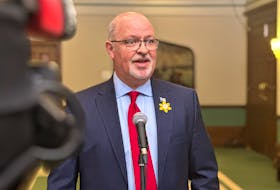Duncan Searle’s story of surviving cancer with the help of targeted treatment is the kind that motivates people like Dr. Paola Marignani .
A cancer researcher and professor in Dalhousie’s Department of Biochemistry and Molecular Biology, her research is looking at ways to target cancer cells while having limited impact on the healthy cells around them.
“Up until recently, treatments have gone in and destroyed a lot of the healthy cells,” she said. “A targeted approach allows us to go after those cells that express a particular type of mutation.”
Often those mutations in one person’s cancer are similar in another’s so by finding one treatment that works, they can help many people.
In Searle’s case for instance the compound he’s been treated with for his lung cancer is being trialed in breast cancer patients now.
These results don’t come without a lot of hours of research, however, state of the art technology and passionate people who want to make a difference. That’s why
Marignani speared the proposal behind this year’s Molly Appeal which will raise funds to provide Dalhousie researchers with resources to develop personalized cancer treatments, tailored to the specific genetic and molecular profile of individual patient’s cancer.
One of these resources is the Fluidigm C1 System, advanced equipment that will allow Dalhousie cancer researchers to analyze tumour cells from patients across the Maritimes. This will help them understand more about each patient's unique tumour, so treatment can be tailored more precisely to that particular cancer.
“Every person’s cancer is unique, like their fingerprints,” Marignani said. “Even when two people have what seems to be the same kind of cancer, they don’t necessarily respond the same way to treatment. We need to dig deeper, to the genetic and molecular roots of each individual’s cancer to find a way to stop it.”
The other crucial part of this cancer research is the tumour bank at the QEII Health Sciences Centre, which collects, analyzes and stores tumour tissues, blood, DNA and data from cancer patients across the four Atlantic Provinces. It currently houses Canada's largest collection of lung cancer tissues and data. Molly Appeal funding will help them expand their ability to collect more different kinds of tumours (pancreas, colon, breast, myelomas, etc.) and facilitate researchers' access to this incredibly valuable research resource.
Searle’s story of being successfully treated twice with targeted medicines isn’t common, Marignani says. But she hopes with funding support more and more people will get the extra years of life to enjoy.
“I don’t know how often it happens, but it has to happen more often,” she said.
For more information on the Molly Appeal and how you can help visit www.mollyappeal.ca








